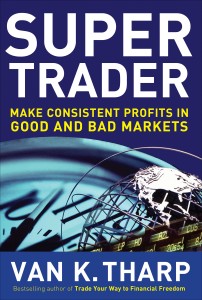SUPER TRADER – Book Review and Giveaway: Million Dollar Journey |
Posted: 26 Oct 2009 03:30 AM PDT  Lately I’ve been taking some of my free time in the evening to catch up on some reading. After finishing The Secret Language of Money, the next book on the list is called Super Trader – Make Consistent Profits in Good and Bad Markets written by Van K. Tharp. Lately I’ve been taking some of my free time in the evening to catch up on some reading. After finishing The Secret Language of Money, the next book on the list is called Super Trader – Make Consistent Profits in Good and Bad Markets written by Van K. Tharp.About the Author:According to the book:Van K Tharp, Ph. D., is an internationally recognized consultant and coach to traders and investors, as well as the founder and president of the Van Tharp Institute. He is the author of multiple bestselling books on trading and investing, including Trade Your Way to Financial Freedom, Safe Strategies for Financial Freedom, Financial Freedom Through Electronic Day Trading, The Definitive Guide to Position Sizing and The Peak Performance Course for Traders and Investors. Tharp is a popular speaker who develops and presents workshops for trading firms and individuals around the world. He has published numerous articles and has been featured in publications such as Forbes, Barron’s, Market Week, and Investor’s Business Daily. About the BookAs I mentioned above, this book really focuses on the psychological side of trading instead of technical. It talks about creating a system for yourself starting with eliminating limiting beliefs, developing a business plan/trading system and position sizing.This book is not for you if you are looking to learn about charts and technical indicators. Here is what Super Trader consists of: Part 1: Working on Yourself: The Critical Component That Makes It All Work Part 2: Developing a Business Plan: Your Working Guide to Success in the Markets Part 3: Develop a Trading System That Fits Each Market Type You Plan To Trade Part 4: Understanding the Importance of Position Sizing Part 5: More Ideas for Producing Optimal Trading Performance Final ThoughtsThis book is for someone who is serious about taking their trading to the next level. Tharp believes that a successful trader isn’t one who knows all the technicals of trading but someone who has mastered the psychology of trading and using a sound business plan.Want a Free Copy?McGraw-Hill was generous in offering Million Dollar Journey readers the chance to win 3 copies of the book. The details are below:
|
| You are subscribed to email updates from Million Dollar Journey | Email delivery powered by Google |
| Google Inc., 20 West Kinzie, Chicago IL USA 60610 | |

No comments:
Post a Comment
Your comments are welcomed but moderated to prevent spam.